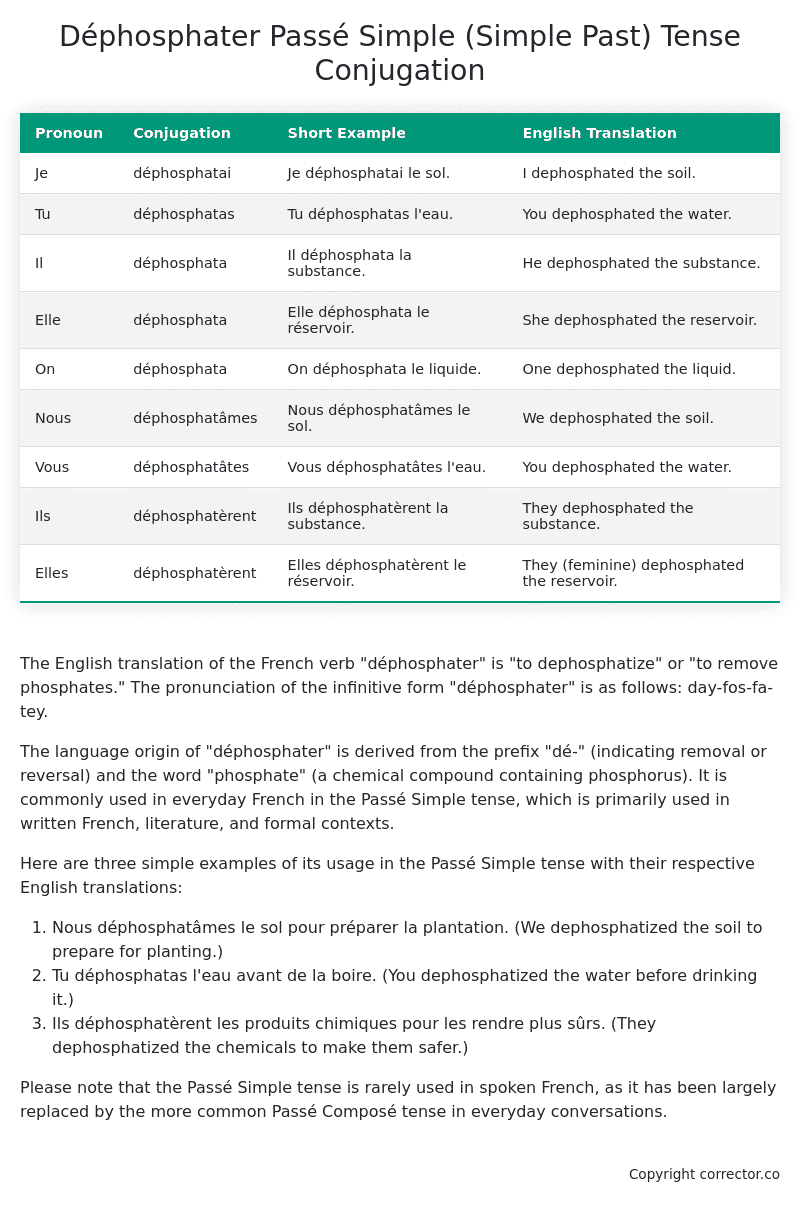Passé Simple (Simple Past) Tense Conjugation of the French Verb déphosphater
Introduction to the verb déphosphater
The English translation of the French verb “déphosphater” is “to dephosphatize” or “to remove phosphates.” The pronunciation of the infinitive form “déphosphater” is as follows: day-fos-fa-tey.
The language origin of “déphosphater” is derived from the prefix “dé-” (indicating removal or reversal) and the word “phosphate” (a chemical compound containing phosphorus). It is commonly used in everyday French in the Passé Simple tense, which is primarily used in written French, literature, and formal contexts.
Here are three simple examples of its usage in the Passé Simple tense with their respective English translations:
- Nous déphosphatâmes le sol pour préparer la plantation. (We dephosphatized the soil to prepare for planting.)
- Tu déphosphatas l’eau avant de la boire. (You dephosphatized the water before drinking it.)
- Ils déphosphatèrent les produits chimiques pour les rendre plus sûrs. (They dephosphatized the chemicals to make them safer.)
Please note that the Passé Simple tense is rarely used in spoken French, as it has been largely replaced by the more common Passé Composé tense in everyday conversations.
Table of the Passé Simple (Simple Past) Tense Conjugation of déphosphater
| Pronoun | Conjugation | Short Example | English Translation |
|---|---|---|---|
| Je | déphosphatai | Je déphosphatai le sol. | I dephosphated the soil. |
| Tu | déphosphatas | Tu déphosphatas l’eau. | You dephosphated the water. |
| Il | déphosphata | Il déphosphata la substance. | He dephosphated the substance. |
| Elle | déphosphata | Elle déphosphata le réservoir. | She dephosphated the reservoir. |
| On | déphosphata | On déphosphata le liquide. | One dephosphated the liquid. |
| Nous | déphosphatâmes | Nous déphosphatâmes le sol. | We dephosphated the soil. |
| Vous | déphosphatâtes | Vous déphosphatâtes l’eau. | You dephosphated the water. |
| Ils | déphosphatèrent | Ils déphosphatèrent la substance. | They dephosphated the substance. |
| Elles | déphosphatèrent | Elles déphosphatèrent le réservoir. | They (feminine) dephosphated the reservoir. |
Other Conjugations for Déphosphater.
Le Present (Present Tense) Conjugation of the French Verb déphosphater
Imparfait (Imperfect) Tense Conjugation of the French Verb déphosphater
Passé Simple (Simple Past) Tense Conjugation of the French Verb déphosphater (You’re reading it right now!)
Passé Composé (Present Perfect) Tense Conjugation of the French Verb déphosphater
Futur Simple (Simple Future) Tense Conjugation of the French Verb déphosphater
Futur Proche (Near Future) Tense Conjugation of the French Verb déphosphater
Plus-que-parfait (Pluperfect) Tense Conjugation of the French Verb déphosphater
Passé Antérieur (Past Anterior) Tense Conjugation of the French Verb déphosphater
Futur Antérieur (Future Anterior) Tense Conjugation of the French Verb déphosphater
Subjonctif Présent (Subjunctive Present) Tense Conjugation of the French Verb déphosphater
Subjonctif Passé (Subjunctive Past) Tense Conjugation of the French Verb déphosphater
Subjonctif Imparfait (Subjunctive Imperfect) Tense Conjugation of the French Verb déphosphater
Conditionnel Présent (Conditional Present) Tense Conjugation of the French Verb déphosphater
Conditionnel Passé (Conditional Past) Tense Conjugation of the French Verb déphosphater
Conditionnel Passé II (Conditional Past II) Tense Conjugation of the French Verb déphosphater
L’impératif Présent (Imperative Present) Tense Conjugation of the French Verb déphosphater
L’impératif Passé (Imperative Past) Tense Conjugation of the French Verb déphosphater
L’infinitif Présent (Infinitive Present) Tense Conjugation of the French Verb déphosphater
L’infinitif Passé (Infinitive Past) Tense Conjugation of the French Verb déphosphater
Le Participe Présent (Present Participle) Tense Conjugation of the French Verb déphosphater
Le Participe Passé (Past Participle) Tense Conjugation of the French Verb déphosphater
Struggling with French verbs or the language in general? Why not use our free French Grammar Checker – no registration required!
Get a FREE Download Study Sheet of this Conjugation 🔥
Simply right click the image below, click “save image” and get your free reference for the déphosphater Passé Simple tense conjugation!

Déphosphater – About the French Passé Simple (Simple Past) Tense
Formation
Usage
Narration
Historical Context
Interactions with other tenses
Passé Composé
Imparfait
Conditional and Subjunctive
Summary
I hope you enjoyed this article on the verb déphosphater. Still in a learning mood? Check out another TOTALLY random French verb conjugation!


